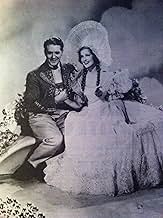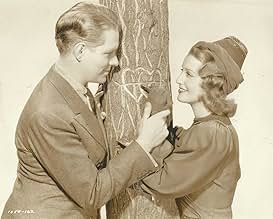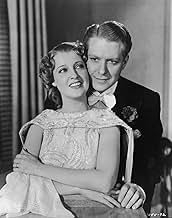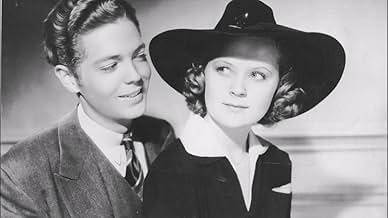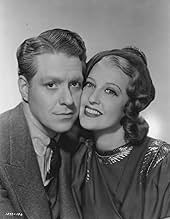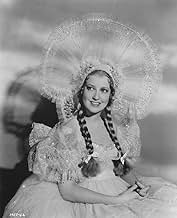IMDb RATING
6.2/10
770
YOUR RATING
The team behind a successful Broadway production tries to stop the married stars from transitioning to Hollywood.The team behind a successful Broadway production tries to stop the married stars from transitioning to Hollywood.The team behind a successful Broadway production tries to stop the married stars from transitioning to Hollywood.
- Nominated for 2 Oscars
- 5 wins & 2 nominations total
Featured reviews
A high-budget offering for MGM stars Nelson Eddy and Jeanette Macdonald, and the studio's first film to be released in Technicolor (Maytime had been started but not completed in this process), centres on a lovey-dovey couple who have worked for years in a Broadway success and are offered the chance to work in Hollywood. How do their theatre collaborators stop them going there?
Unusually for films featuring the Singing Sweethearts, this one has a sparky and funny script (largely by Dorothy Parker and Alan Campbell) from which it benefits. Not many songs have survived from the Broadway production of the real 'Sweethearts' (sadly, the omissions include 'The Cricket on the Hearth', which was really quite a sweet song), and others have been added to flesh out the Hollywood fantasy. Perhaps the best numbers are 'Pretty as a Picture' and 'On Parade'.
In support are Frank Morgan ('the Wizard of Oz'), Ray Bolger (not used anywhere near enough), and the poor man's Eddy and Macdonald, Douglas MacPhail and Betty Jaynes, who suffer from a total lack of charisma. The leads themselves are fine and do with the more meaty than usual material. Perhaps their more slushy collaborations such as 'Rose Marie' and 'Maytime' are better overall, but 'Sweethearts' is definitely worth a look.
Unusually for films featuring the Singing Sweethearts, this one has a sparky and funny script (largely by Dorothy Parker and Alan Campbell) from which it benefits. Not many songs have survived from the Broadway production of the real 'Sweethearts' (sadly, the omissions include 'The Cricket on the Hearth', which was really quite a sweet song), and others have been added to flesh out the Hollywood fantasy. Perhaps the best numbers are 'Pretty as a Picture' and 'On Parade'.
In support are Frank Morgan ('the Wizard of Oz'), Ray Bolger (not used anywhere near enough), and the poor man's Eddy and Macdonald, Douglas MacPhail and Betty Jaynes, who suffer from a total lack of charisma. The leads themselves are fine and do with the more meaty than usual material. Perhaps their more slushy collaborations such as 'Rose Marie' and 'Maytime' are better overall, but 'Sweethearts' is definitely worth a look.
Not only was this their first color film, but this was the first story set in contemporary time (1938). Plus, the script has some funny "one-liners." However, I wouldn't recommend this to anyone but fans of Nelson and Jeanette.
Sweethearts is the first of two of the Jeanette MacDonald/Nelson Eddy films to be done in technicolor, the second at last being Bittersweet. It is also the first MGM film done in modern technicolor, though in Jeanette's The Cat and the Fiddle, the last 10 minutes were in color. And it is the only one of their films besides Bittersweet where they start off as man and wife.
The original operetta by Victor Herbert was done in 1913 and it was in fact a story set in Holland as the numbers do show. But this film is like the later one Nelson did with Rise Stevens, The Chocolate Soldier, in that he and Stevens are husband and wife appearing in The Chocolate Soldier while the plot of that is taken from Ferenc Molnar's The Guardsman.
Sweethearts has an original script by Dorothy Parker and it involves two happily married singing co-stars of a long running operetta, named Sweethearts. They've been appearing on Broadway for seven years in the same show.
In fact a whole cottage industry has grown up around Sweethearts. Producer Frank Morgan, songwriter Herman Bing, librettist Mischa Auer have had it real good for seven years. They've been quite content to live off the box office of Sweethearts as long as MacDonald and Eddy keep appearing. Also the extended families of both Eddy and MacDonald live off of them as well.
When Reginald Gardiner woos them on behalf of Hollywood producer George Barbier, panic ensues among the ranks of the cottage industry. These people might actually have to go to work.
Knowing Dorothy Parker wrote 50% of the script, you can imagine it is a witty one. Jeanette and Nelson are in good voice and the musical calls for a large number of duets. They sing the title song, For Every Lover Meets His Fate, and an interpolated non Victor Herbert song, Our Little Grey Home in the West in anticipation of their California excursion. In addition Jeanette sings A Summer Serenade which was originally an instrumental Victor Herbert composition entitled Badinage. Robert Wright and Chet Forrest gave it some lyrics for the film. Nelson has a good typical Nelson marching song in On Parade.
After appearing with Nelson Eddy in Rosalie as a sidekick Ray Bolger didn't have as many scenes, but got to show his dancing talent a lot more in the Wooden Shoes number. Jeanette personally interceded with Louis B. Mayer and got Douglas MacPhail and Betty Jaynes cast as their understudies.
MacPhail and Jaynes married later on, but divorced after MacPhail's career took a nosedive in the early Forties. He was a good singer who you might remember appeared with Mickey Rooney and Judy Garland in Babes in Arms and later introduced the Cole Porter classic, I Concentrate on You in Broadway Melody of 1940. Tragically he took his own life after the divorce for God only knows what reasons.
For Jeanette and Nelson fans and for those who like to see Ray Bolger in something else besides The Wizard of Oz, Sweethearts in highly recommended.
The original operetta by Victor Herbert was done in 1913 and it was in fact a story set in Holland as the numbers do show. But this film is like the later one Nelson did with Rise Stevens, The Chocolate Soldier, in that he and Stevens are husband and wife appearing in The Chocolate Soldier while the plot of that is taken from Ferenc Molnar's The Guardsman.
Sweethearts has an original script by Dorothy Parker and it involves two happily married singing co-stars of a long running operetta, named Sweethearts. They've been appearing on Broadway for seven years in the same show.
In fact a whole cottage industry has grown up around Sweethearts. Producer Frank Morgan, songwriter Herman Bing, librettist Mischa Auer have had it real good for seven years. They've been quite content to live off the box office of Sweethearts as long as MacDonald and Eddy keep appearing. Also the extended families of both Eddy and MacDonald live off of them as well.
When Reginald Gardiner woos them on behalf of Hollywood producer George Barbier, panic ensues among the ranks of the cottage industry. These people might actually have to go to work.
Knowing Dorothy Parker wrote 50% of the script, you can imagine it is a witty one. Jeanette and Nelson are in good voice and the musical calls for a large number of duets. They sing the title song, For Every Lover Meets His Fate, and an interpolated non Victor Herbert song, Our Little Grey Home in the West in anticipation of their California excursion. In addition Jeanette sings A Summer Serenade which was originally an instrumental Victor Herbert composition entitled Badinage. Robert Wright and Chet Forrest gave it some lyrics for the film. Nelson has a good typical Nelson marching song in On Parade.
After appearing with Nelson Eddy in Rosalie as a sidekick Ray Bolger didn't have as many scenes, but got to show his dancing talent a lot more in the Wooden Shoes number. Jeanette personally interceded with Louis B. Mayer and got Douglas MacPhail and Betty Jaynes cast as their understudies.
MacPhail and Jaynes married later on, but divorced after MacPhail's career took a nosedive in the early Forties. He was a good singer who you might remember appeared with Mickey Rooney and Judy Garland in Babes in Arms and later introduced the Cole Porter classic, I Concentrate on You in Broadway Melody of 1940. Tragically he took his own life after the divorce for God only knows what reasons.
For Jeanette and Nelson fans and for those who like to see Ray Bolger in something else besides The Wizard of Oz, Sweethearts in highly recommended.
"Sweethearts" has so much going for it that it's painful to admit to some lesser Victor Herbert songs as main features. Eddy and MacDonald are fine, the Technicolor is lovely, and the cast is top notch. Unfortunately, there are only about two songs that are worthy of the great Herbert.
Well, every composer can't turn out all hits; it's just unfortunate that the lesser songs are given such up front treatment. As much as the stars pour their all into these songs, they fall rather flat and unmemorable.
The production numbers are spectacular, the production design lovely, and the costumes eye-popping. Too bad this one didn't rise to the level of the duo's other film entries. Still, kudos to the quality of both the singing and acting of Eddy-MacDonald.
Well, every composer can't turn out all hits; it's just unfortunate that the lesser songs are given such up front treatment. As much as the stars pour their all into these songs, they fall rather flat and unmemorable.
The production numbers are spectacular, the production design lovely, and the costumes eye-popping. Too bad this one didn't rise to the level of the duo's other film entries. Still, kudos to the quality of both the singing and acting of Eddy-MacDonald.
Sweethearts was the first color film for Nelson & Jeanette, and they, and the film are quite beautiful.They portray a married couple, appearing in musical comedy. This shows Nelson at his most playful--the "Pretty as A Picture" duet was so personal, I thought I was privy to a private moment between them. Too bad, MGM never took advantage of Nelson's self depreciating talent, but this film is most interesting, because it gives us a fascinating glimpse of what might have been.
Did you know
- TriviaThis is MGM's first full-length film to feature a different lion roaring in the logo, by the name of Tanner. He appeared at the beginning of MGM's Technicolor feature films and cartoons from 1936 to 1956 and later, from 1963 to 1967.
- Quotes
Felix Lehman: [Counting on Gwen and Ernest's gullibility] I'm an old man and I don't get many pleasures, but you go ahead. Just think about yourselves. Forget about me.
- Crazy creditsA written epilogue explains: "In our screen play, certain dramatic liberties have been taken with the operetta 'SWEETHEARTS'. We depict the scenes from the operetta as though it was a recent production presented by a wholly fictitious producer Felix Lehman and composed and written by two wholly imaginary persons Oscar Engel and Leo Kronk whereas the stage operetta 'SWEETHEARTS' was actually written and produced on the stage about 1913, Victor Herbert composing the music and Frédérique De Grésac (as Fred de Gresac), Robert B. Smith and Harry B. Smith writing the book and lyrics."
- ConnectionsFeatured in Nelson and Jeanette (1993)
- SoundtracksSweethearts
(1938) (uncredited)
Music by Victor Herbert (1913)
Lyrics by Bob Wright and Chet Forrest
Played during the opening credits and often in the score
Performed by Jeanette MacDonald and Nelson Eddy
Reprised by them for a radio broadcast with chorus
Later sung by MacDonald with Douglas McPhail and Eddy with Betty Jaynes
Details
- Runtime
- 1h 54m(114 min)
- Color
- Aspect ratio
- 1.37 : 1
Contribute to this page
Suggest an edit or add missing content

